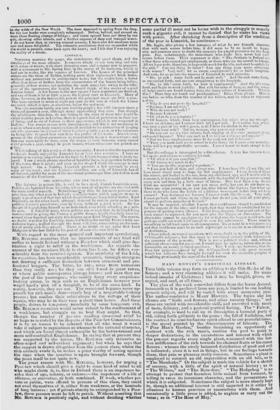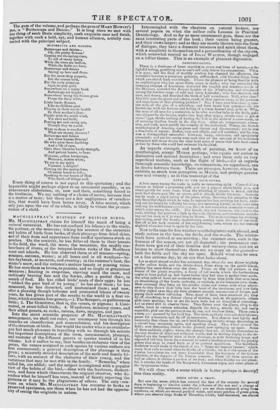MARY HOWITT'S cnntsrsrAs LIBRARY.
THIS little volume may form an addition to the Gift-Books of the Season; and a very charming addition it will make. Its name indeed smacks of Christmas ; but it may be bought, given, ac- cepted, and read, at all times. The plan of the work somewhat differs from the lesser Annual, inasmuch as it is produced from one pen, is limited to one leading generic subject, and will be varied with every successive year. The author-conductor is Marry Howirr. The topics she has chosen are " birds and flowers, and other country things; " and these are varied with considerable skill, and executed with much of taste, delicacy, and a pastoral-poetical feeling. The " Falcon," fur example, is used to call up in description a baronial party of old, riding forth gallantly to the game: the fall of feudalism, and the contrast its semi-barbarous spirit offered to our peaceful times, is the moral pointed by the discontinuance of falconry. The " Poor Man's Garden," besides furnishing an opportunity of contrast with the rich man's, enables the poet to point to deeper distinctions, in the earnestness and interest with which the peasant regards every single plant, compared with the list- less indifference of the rich towards his choicest fruits or his rarest flowers : whence the nicely balancer] distribution of good and evil is indicated; since it is not in things, but in our feelings towards them, that pain or pleasure really consists. Sometimes a plant p employed to connect an old superstition with an old talc, as in " The Mandrake." Or the subject is made the vehicle for a sketch of scenery, with a little of the spirit of natural history ; as Its " The Wolves," and "The Rein-deer." " The Hedgehog " is an attempt to protect that harmless little animal from torment, by telling in verse its innoxious character, and the persecutions to which it is subjected. Sometimes the subject is more closely kept to, though an additional interest is still imparted to it either by allusions to human practices or associations with them. And occasionally a little prose is added, to explain or carry out the verse; as in "The Rose of May." The gem of the volume,and perhaps the gem of MARY Howirr's pen, is " Buttercups and Daisies." It is long since we met with any thing of such Doric simplicity, such exquisite ease and finish,
together with such a bold, apt, and human allusion, artfully con- nected with the principal subject.
NETTERCEPS AND DAISIES.
Buttercups and daisies—
Oh, the pretty flowers ! Coming ere thespring-time, To tell of sonny hours. While the trees are leafiest!, While the fields are bare, Buttercups and daisies Spring up here and there.
Ere the snow-drop peepeth, Ere the crocus bold, Ere the early primrose Opes its paly gold, Somewhere on a sunny bank Buttercups are blight; Somewhere 'tnong the frozen grass Peeps the daisy white.
Little hardy flowers, Like to children poor Playing in their sturdy health By their mother's door : Purple with the north wind, Yet alert and bold; Fearing sot and caring not, Though they be a-cold.
'What to them is weather !
What are stormy showers ! Buttercups and daisies Are these human flowers!
He who gave them hardship And a life of care, Gave them likewise hardy strength, And patient hearts, to bear.
Welcome, yellow buttercups, Welcome, daisies white, Ye are in my spirit Visioned, a delight ! Coming ere the spring-time,
Of sunny hours to tell—
Speaking to our hearts of Hot
Who doeth all things well.
Every thing of course is not equal to this quotation ; and the hypercritic might perhaps object to an occasional puerility, or an unnecessary elaboration, or, now and then, something forced in the liveliness. We say nothing of a choice of' metre, because that is a matter of taste; but there are a few negligences of versifica- tion, that would have been better away. A false accent, which only jars upon the ear of an adult, is likely to vitiate the pronun- ciation of a child.



























 Previous page
Previous page